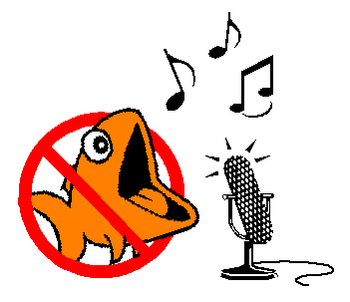 Much as we would like to think that every time we open our mouths in a musical setting, it is like angels singing, and we are always perfectly rehearsed with exactly the right words in front of us, and remembering every single tip and hint we’ve heard whilst learning the songs, we know it doesn’t happen like that.
Much as we would like to think that every time we open our mouths in a musical setting, it is like angels singing, and we are always perfectly rehearsed with exactly the right words in front of us, and remembering every single tip and hint we’ve heard whilst learning the songs, we know it doesn’t happen like that.
It is a hard thing to accept, but the mark of a professional is not the ability to never get it wrong. The mark of professionalism (and I count choirs in that as well) is the ability to get it completely, appallingly, skin-shrinkingly wrong and still carry on with a smile. Because it happens to us ALL. Everyone who has ever performed live has had something go terribly, terribly wrong. I am now going to share one of my all-time favourite Youtube clips with you. If 1980’s glam rock ‘n’ roll isn’t your thing, I apologise, but I want you to stick with it. This is supergroup, Van Halen, playing their huge hit, “Jump” and getting it so appallingly, terrifyingly, sickeningly wrong that watching it is like watching a train crash. You know you shouldn’t look, but somehow you just can’t stop… (For those who want to know what had gone so wrong, apparently the keyboards are pre-recorded and got played at the wrong speed, there was no way for the guitarist to play the same notes without retuning his entire guitar). Please watch this. It’s about 6 minutes (the guitar solo is a particular highlight at just after 3 minutes), but really, you’ll feel better about everything you’ve ever got wrong afterwards, because you’ve never got it wrong in front of several thousand people who all paid £50+ for tickets…
https://youtu.be/yXPM6d9IdiY?list=RDyXPM6d9IdiY
Oh, but it’s a hot mess. But notice what they did? They didn’t stop. They didn’t glare at one another. They didn’t look distressed. They jumped a little higher, sang a little louder, smiled a little harder and (if you made it to the end) rode a giant inflatable microphone around the stage like a bucking bronco! Notice what the crowd did? The crowd went WILD! They loved it! How could they possibly have loved a version of a song so bad that not even its mother could love it?
The thing is, with this performance, and every performance ever (even more so with community choirs, I’ve found), is that the audience really want you to get it right. The fun for them is in seeing something confident and effortless. I don’t know if you’ve ever seen a really scared or upset performer, but it’s not a good thing. You feel awful for them. You want to jump up, take the microphone away and cuddle them. There is no enjoyment in watching someone getting something wrong and then being uncomfortable and scared in the spotlight. However, watching someone get something wrong, and turning it into a joke, or smiling, getting the right note in the second verse and carrying on? Yes! That’s great! If the performers are comfortable and smiling, so is the audience. You get extra brownie points for carrying on and turning it around. Because that’s more professional than giving up or bursting into tears or storming off the stage. So here are my top tips for what to do when it all goes wrong…
- Smile. Your instinctive reaction when something goes wrong should be to grin at the audience as if you are sharing something really funny with them. They’ll feel instantly comfortable and probably won’t even notice something went wrong.
- Don’t stop. Unless your choir leader stops you – carry on! If your choir leader does stop you, smile at them with confidence. They’ll get you right, and as far as the audience knows, it’s their fault, not yours!
- Mime for a bit. If you’ve lost your place or feel your vocal line has run away with no hope of coming back in this verse, just mime for a bit. Or sing the melody for a while. Worst case, everyone sings the melody and it sounds like the arrangement was meant to do that anyway!
- Jump back on the roundabout when it comes round again. If there’s a bit of the song that is really familiar – the chorus is a good place – wait until it comes round again (either miming or singing melody as above) then jump back in with the right note at the right place.
- Edge closer to someone who is singing your part and sounds confident. There’s often one or two people in every choir that are pretty confident about what they are singing. Try and hear what they are doing. Unless, of course, you are one of those people, in which case, default to the melody, and to heck with it!
The greatest piece of musical advice I was ever given was this: “Start well and finish well, and they’ll forgive *anything* in the middle”. It’s very, very true.
If you need anything else to bolster your confidence by remembering that this happens to professionals, I give you my last offering: Paul McCartney screwing up “Hey Jude” at the Olympics in 2012, whilst THE WHOLE WORLD was watching. Poor chap.
 Last time we looked at how words can affect small children, crushing their self-esteem and leaving them unable to join in with our singing culture for decades. It’s horrible. Don’t do it.
Last time we looked at how words can affect small children, crushing their self-esteem and leaving them unable to join in with our singing culture for decades. It’s horrible. Don’t do it. You’d be surprised at how many people come to my community choirs (and from what I’ve heard from other choir leaders – their community choirs, too) with absolutely no self-confidence in their ability to be able to sing.
You’d be surprised at how many people come to my community choirs (and from what I’ve heard from other choir leaders – their community choirs, too) with absolutely no self-confidence in their ability to be able to sing. As optimistic people say, “I love getting old – it beats the alternative!”. Dealing with an ageing voice is something that hopefully we will all be dealing with at some point. Mind you, the definition of “an aging voice” is probably going to be a bit shocking for you. Medically speaking, we are growing, filling out and extending our bodies until we reach the ripe old age of… approximately 35. After that, the studies tell us, it’s all a bit downhill. Personally speaking, I peaked a good few years back, according to that!
As optimistic people say, “I love getting old – it beats the alternative!”. Dealing with an ageing voice is something that hopefully we will all be dealing with at some point. Mind you, the definition of “an aging voice” is probably going to be a bit shocking for you. Medically speaking, we are growing, filling out and extending our bodies until we reach the ripe old age of… approximately 35. After that, the studies tell us, it’s all a bit downhill. Personally speaking, I peaked a good few years back, according to that! I’m writing this from home today as I am not feeling very well. I have a cold, but one that doesn’t seem to have lingered around my nose and sinuses as they often do, but one which seems to have skipped straight to my throat and lungs, leaving me with a high temperature whilst trying to fight it off.
I’m writing this from home today as I am not feeling very well. I have a cold, but one that doesn’t seem to have lingered around my nose and sinuses as they often do, but one which seems to have skipped straight to my throat and lungs, leaving me with a high temperature whilst trying to fight it off. You’ve heard the phrases, “chest voice” and “head voice”. They get thrown around in singing lessons and choirs quite a lot. But if we are not careful, they can be overused terms which are never properly explained. So, what do they mean?
You’ve heard the phrases, “chest voice” and “head voice”. They get thrown around in singing lessons and choirs quite a lot. But if we are not careful, they can be overused terms which are never properly explained. So, what do they mean?